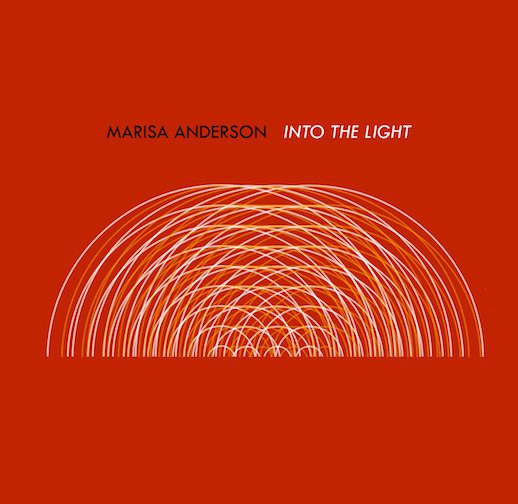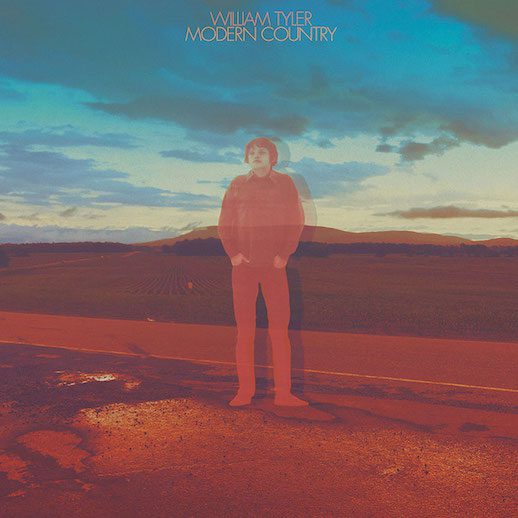William Tyler: Modern Country (Merge, out today)
Marisa Anderson: Into The Light (Chaos Kitchen Music, released 24 June)
Reviewed by Ian Preece
Listening to William Tyler’s new record on my iPod recently, I got stuck on the London Overground just outside Stratford, the lunar landscape of the Olympic Park flickering by between empty container berths on a never-ending freight train. I’d practically listened to the whole of side one before we were on the move, and, yes, this album is so fantastic, so transformative that, squinting through the window into the gloom, I could almost make out the Great Plains and rail yards of North Dakota, rather than the semi-industrial hinterlands and warehouses of Hackney Wick.
In a trailer for the album Tyler talks of having spent the better part of two years touring solo and driving backwards and forwards across America and falling back in love with the vastness of his country. But it’s a feeling suffused with melancholy, regret, longing, and w(e)ariness: ‘We stand in the precipice of the twilight of empire, the decline of so many national institutions and the vanishing of certainties.’ He talks of a dissipating cultural geography of America, ‘a slow fade . . . Modern Country is a love letter to what we are losing in America ‒ to what we’ve already lost.’ I could be wrong, but you sense he means fairgrounds and decent late-night radio, cool 1960s cars and upstanding, honest values, a sense of community and how to behave as human beings to one another ‒ as well as that old road-side diner where you could get a stack of blueberry pancakes for a dollar for breakfast before they shut down the nearby cd-pressing plant and nobody came by any more. It’s all there in the shimmering ambience and near-motorik beat of the opening track, ‘Highway Anxiety’, which builds from a Neu!-like placid opening to an expansive, rolling, widescreen Techincolor cruise down the Interstate, all slippery drums and languid guitar and a lengthy fade. If this track were a car, it’d be a low-slung, dusty green Cadillac ‒ luxurious suspension and upholstery, faded 1960s paintwork. Way back when, in college days, I used to fantasise with an old friend about releasing the ultimate motorway compilation album: the Velvet Underground’s ‘What Goes On’ and ‘Run Run Run’, plenty of The Wedding Present, and songs of relentless chug and groove like Lee Morgan’s ‘The Sidewinder’. This was before either of us could drive, or had heard of Neu! or Can – but now William Tyler has gone and taken the concept one step further and built on his recent ‘Lost Colony’ 12-inch (which featured a Michael Rother cover), marrying a kind of Southern country guitar to a gentler, open-ended but no less fluid notion of the autobahn.
‘I’m Gonna Live Forever (if it Kills Me)’ has a few more spidery licks, but sits atop a warm bed of keyboards and the same pulsing drum beat: there’s no question the sound is fuller than on Tyler’s last Merge LP, The Impossible Truth from 2013, an album of mostly solo guitar that nevertheless contained some stunningly infectious riffs (‘Last Residents of Westfall’; ‘We Can’t Go Home Again’). This time around there’s something approaching a full band, including Phil Cook of Hiss Golden Messenger, Jeff Tweedy and Jim O’Rourke bassist Darin Gray, and Glenn Kotche of Wilco on ‘percussion’.
Third track ‘Kingdom of Jones’ begins with a guitar figure of almost old-time Southern sprightliness. It could be a gentler outtake from one of those excellent Dust-to-Digital compilations – something like Joe Bussard’s recent collection of Civil War era tunes, The Year of Jubilo – but Tyler is celebrating Jones County, Mississippi, which seceded from the Confederacy during the Civil War and became a refuge for deserters. After a pause midway through, a beautifully warm elegiac riff unfurls at a slower pace, and you can picture the dissenters, mournfully surveying the carnage at hand from their campfire, wondering what has become of their land. Or, as William Tyler more pertinently writes, ‘As someone who is proud to be Southern, but struggles constantly with the weight of the history of my homeland, I like thinking about the people of Jones County during the War. They must have realised something that a lot of people still haven’t figured out.’
I’m guessing that on vinyl ‘Albion Moonlight’ – a brief, reflective piece of solo guitar, twinned what sounds like the beautiful underlying vox organ from The Impossible Truth’s ‘Last Residents of Westfall’ percolating through towards the end ‒ will close side one before things pick up in a more rhythmic direction again.
‘Gone Clear’ opens with a taut, brooding, circular guitar figure suddenly replaced with skittering drums as the track fills out with a more languid, stately guitar and what sounds like a brief flash of harpsichord – but Mr Tyler is not one for felt-bootedness, and before you can say, ‘Tortoise, circa Standards and onwards,’ an equally abrupt cascading keyboard refrain and chimes skewer things off course again ‒ a minimal guitar passage supplies the last faint ripple in a darkening pool. Next track ‘Sunken Garden’ opens similarly dolefully, but it soon warms up as the band come in: a slower cousin to ‘Highway Anxiety’, with a few crosscurrents beneath the smooth flow. Again, it could just be my bass(y) headphones, but there’s something about the amble of bass and drums here that reminds me of early Tortoise. The closing track, ‘Great Unwind’, bookends the record ‒ another masterpiece to match ‘Highway Anxiety’. I harboured a fleeting fear it was going to turn into some kind of frayed version of ‘Local Hero’ but the ascending electric guitar grinds to a halt a couple of minutes in, before another shimmering, rippling pause, distorted waves of guitar eventually giving out to a passage of birdsong, then feathery drums and a final irresistible guitar and buzzing synth line emerge, hooking you in before that too fades out very slowly over the course of several minutes, just like all great records did in the twentieth century ‒ the ‘slow fade’; the train eventually becoming a tiny speck, disappearing into a blazing, azure sunset . . .
Marisa Anderson’s new LP bears some similarities with Modern Country. It too is primarily a guitar record, and Into the Light is also a concept album, the soundtrack to an imaginary science-fiction film set in the Sonora desert near the Mexican border – the story of a lost visitor ‘wandering on the shifting borderlines of the desert’, tripping out, I imagine, on various shades of spooky, hostile and perhaps, finally, more welcoming terrain. I wish all science fiction came with guitars like this. There’s something in Anderson’s yearning lap and pedal steel – the widescreen sense of wonder in a track like ‘In Waves’; the quiet despair (or fragile hope) in the slide guitar of the closing ‘End of Night’ – that also says: ‘Them old days: they’ve done been and gone . . .’ And much as I love the economy of her earlier records – a fair few tracks on 2013’s Traditional and Public Domain Songs sound like Spartan, folkified bedfellows to the quieter bits of Jimi Hendrix’s ‘Star Spangled Banner’; the two-minute blues vignettes and sketches of American Primitivism on her Mississippi records, Mercury (2011) or The Golden Hour (2009), the latter’s melancholic, slightly distorted beauty recorded straight to reel-to-reel tape ‒ the fuller sound on Into the Light signals a new south-westerly direction. So much so that immediately after the opening rolling bars of the title track I half expected the rich, gravelly tones of Townes Van Zandt or Guy Clark to come in. As it is, ‘Into the Light’ is a fine opener, with just a scent of Calexico on the desert breeze.

It’s an album of myriad solo guitar hues: ‘Waltz of the Shadows’ creeps along, guitar accompanied by a sinister, fairground electric piano (it could be one of those horror soundtrack 7-inch singles released by Finders Keepers); ‘The Old Guard’ has the bluesy, footstomping swagger of an electrified Mississippi Fred McDowell or R.L. Burnside kicking off on a porch somewhere; an aching descending guitar line on ‘He is Without Guns’ bottoms out into something faintly raga(ish) before gently fading away; ‘Chimes’ is equally gorgeous, featuring, well, chimes, over a hazily building guitar that never really goes anywhere – verse-chorus-verse is overrated anyhow: it’s far better to be quivering with anticipation at the start of a journey than to arrive. The steady pace of ‘Resurrection’ moves things up a gear in an almost Modern Country vein, before ‘House of the Setting Sun’s drone hovers over the desert highway, a shimmering heat-haze of a Migrantes or Charalambides track of old. But on Into the Light you’re never more than a truck stop away from a beautiful melody, and ‘The Golden West’ rolls us out of here wiser, possibly, but perhaps also broken somehow, yet still under hopeful blue skies.
